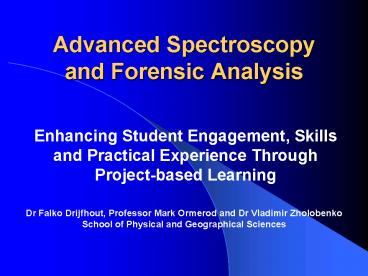Advanced Spectroscopy and Forensic Analysis - PowerPoint PPT Presentation
1 / 22
Title:
Advanced Spectroscopy and Forensic Analysis
Description:
Does it work? CHE-20011 as a case: Relative new module started in 2005-2006 ... Mini-project. Analysis of wastewater for the presence of pharmaceutical drugs ... – PowerPoint PPT presentation
Number of Views:143
Avg rating:3.0/5.0
Title: Advanced Spectroscopy and Forensic Analysis
1
Advanced Spectroscopy and Forensic Analysis
- Enhancing Student Engagement, Skills and
Practical Experience Through Project-based
Learning
Dr Falko Drijfhout, Professor Mark Ormerod and Dr
Vladimir Zholobenko School of Physical and
Geographical Sciences
2
Problem
- Linking lecture material with applications (e.g.
Lab based work) - Apply knowledge - especially in problem solving
situations - Big gap between knowledge obtained in lectures
and real life scenarios
3
Project-Based Learning
- What is it?
- Project-based learning is an individual or group
activity that goes on over a period of time,
resulting in a product, presentation, or
performance. - Usually with the use of technical equipment or an
IT component
4
Project-Based Learning
- Advantages?
- Ability to apply knowledge.
- Motivation to learn material when it is put in a
context in which they see its relevance (OHara
et al., 1999). - Students often engage better when the outcome is
unknown. - Disadvantages?
- Carrying out project without enough knowledge.
- Unable to interpret results.
5
Does it work?
- CHE-20011 as a case
- Relative new module started in 2005-2006
- Several changes carried out over the years
- Main problem was the gap between lab mark and
exam mark - Introduced Project-based learning in 2007-2008
- End of 2007-2008
- Average Lab mark 70 vs. average exam mark 42
6
Problems specific to this module
- Students engage very well in the laboratory work
- Feedback from students is very positive
7
Some Feedback
- Well organized, good scripts (6)
- Labs related to lectures and helped my
understanding (5) - Helpful staff and demonstrators (6)
- Easy to ask questions got helpful answers
- Labs were interesting, enjoyable (3)
- Not enough information given, sometimes
confusing
(mini-project) (6) - Provide handouts on how to use equipment
8
Problems specific to this module
- Students engage very well in the laboratory work
- Feedback from students is very positive
- They all enjoy the lab work
- BUT
- . exam mark is always very low!
9
Possible solutions
- Improve students
- problem solving skills
- understanding of instruments used in the lab
- ? Project-Based learning ..
- with some modifications
- Start with small exercises
- Use of simple data collection software (LoggerPro)
10
LoggerPro
- Logger Pro software provides an inexpensive,
user-friendly way for students to collect and
analyse data with computers. - Logger Pro is the most popular data-collection
program in science and math education because
students find our software easier to learn than
other data-collection programs. - Students can make copies to use at home and not
have to pay extra for that.
Quotes from the LoggerPro Website
http//www.vernier.com/soft/lp.html
11
Vernier LabPro
12
Exercises
- Experiment 1 Evaluation of the Gas
Chromatograph - Experiment 2 Small internal competition
- Experiment 3 Chromatographic analysis of
Petroleum hydrocarbons in soil - Mini project
- Visit to Alcontrol (Quality control lab for
Environment and Food testing)
13
Mini-project
- Analysis of wastewater for the presence of
pharmaceutical drugs - Wastewater collected from Strongford Sewage
Treatment Works in Barlaston, Stoke-on-Trent - Several analytical techniques were used to
- concentrate sample (SPE) and
- analyse the chemicals (GC/MS)
- Group lab report
14
Assessment
- Formative assessment
- Oral presentation on method development
(competition) - Summative assessment
- Exam, proforma, lab report, class tests
- BUT also peer assessment ? students assess their
peers contribution to the lab report
15
Peer assessment Form
16
Self Assessment Form
17
Feedback from students - Lab
- Well organized (5)
- Labs related to lectures and helped my
understanding (8) - Competition was really interesting/fun (4)
- Helpful staff and demonstrators (5)
- Easy to ask questions got helpful answers
- Labs were interesting, enjoyable (2)
- Good step-by-step guidance for the labs, lab
scripts well detailed (4) - Practicals are always fun (2)
- Liked using the GCs
18
Feedback from students - Lectures
- Good content and organisation (10)
- Good lectures, high quality (5)
- Very good teacher quality (2)
- Detailed/good lecture notes (3)
- Lots of information available giving wide
knowledge of forensic techniques (3) - Chromatography and microscopy were interesting
(5) - Developed on from previous knowledge/skills
- Visiting the ALcontrol lab helped to get
perspective (4)
19
Assessment Summary
20
Assessment Summary
21
Evaluation
- Very positive!
- Students were forced (but in a positive way) to
(a) think about and (b) discuss the principles of
chromatography - Successful incorporation of Level I material in
Level II - Developed on from previous knowledge/skills
- Students enjoyed it!!
- Liked using the GCs
- Good that we had peer assessment
22
Next Year??
- Further close the gap between exam marks and lab
marks (in course assessment) - Focus was on chromatography, next year we will
try to incorporate mass spectrometry - Problem-based learning in addition to
Project-based learning???































